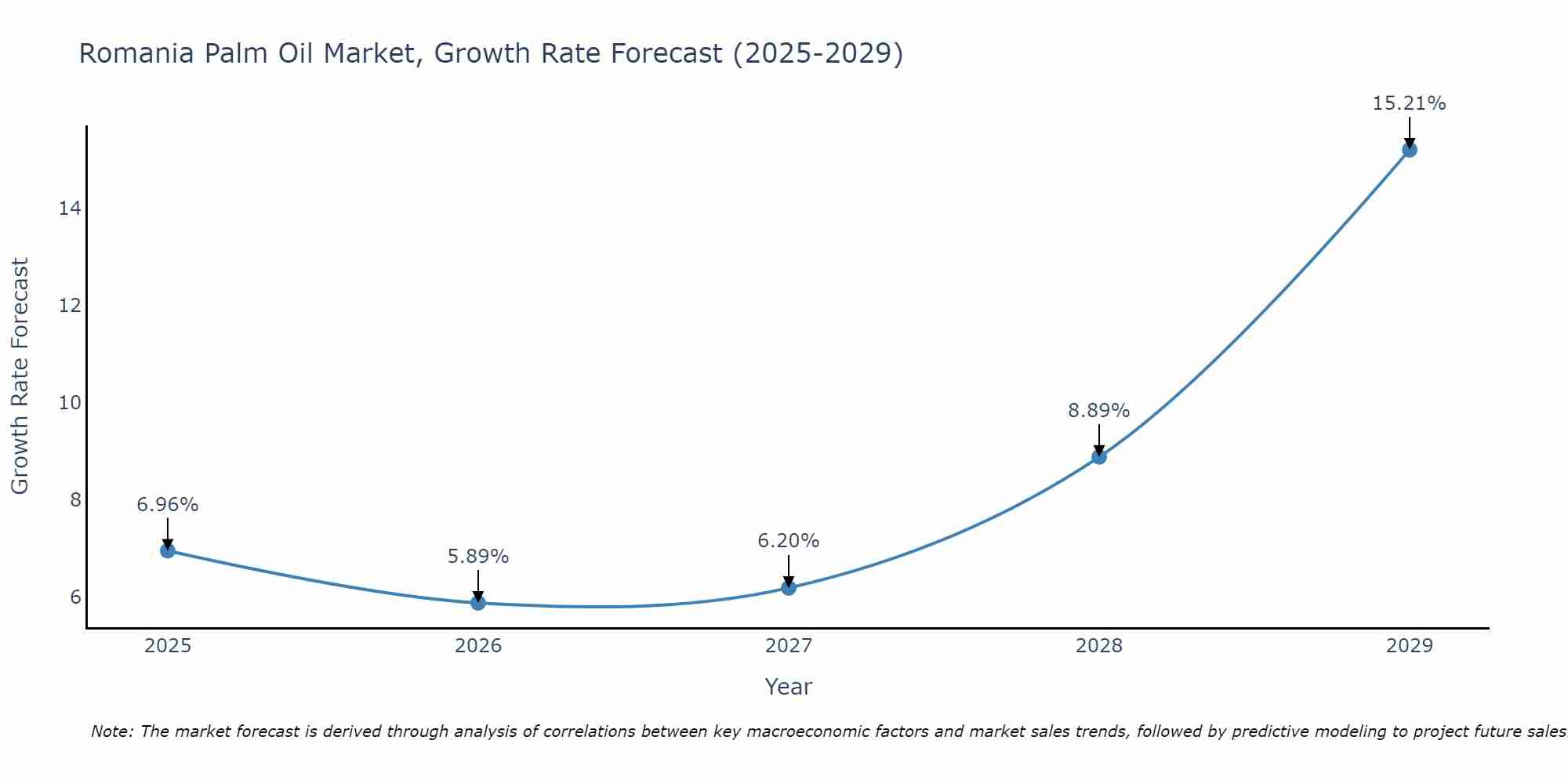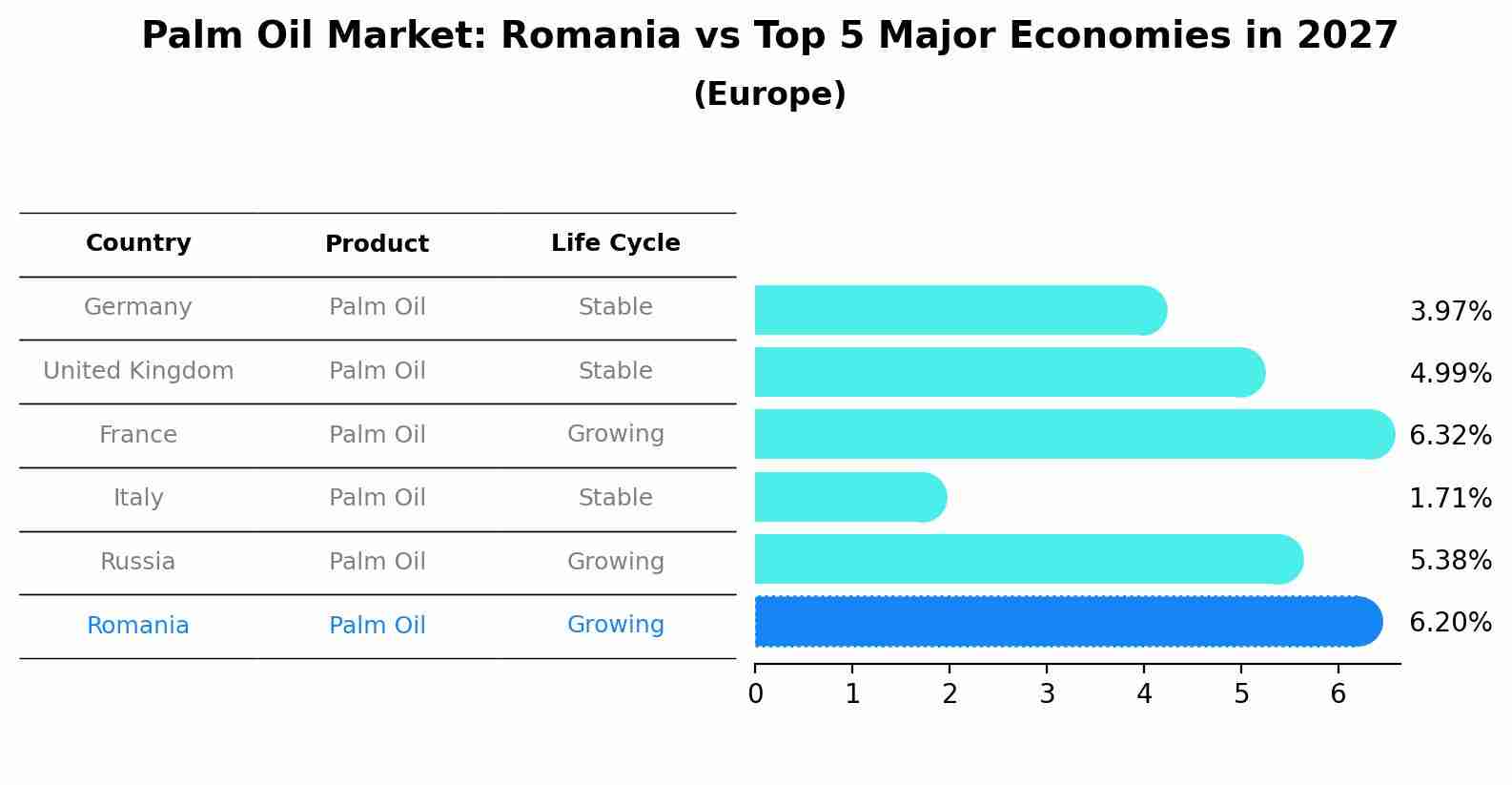Romania Palm Oil Market Outlook | Revenue, Trends, Growth, Share, COVID-19 IMPACT, Analysis, Forecast, Value, Companies, Industry & Size
| Product Code: ETC383778 | Publication Date: Aug 2022 | Updated Date: Jul 2025 | Product Type: Market Research Report | |
| Publisher: 6Wresearch | Author: Summon Dutta | No. of Pages: 75 | No. of Figures: 35 | No. of Tables: 20 |
Romania Palm Oil Market Size Growth Rate
The Romania Palm Oil Market is projected to witness mixed growth rate patterns during 2025 to 2029. The growth rate starts at 6.96% in 2025 and reaches 15.21% by 2029.

Palm Oil Market: Romania vs Top 5 Major Economies in 2027 (Europe)
The Palm Oil market in Romania is projected to grow at a growing growth rate of 6.20% by 2027, within the Europe region led by Germany, along with other countries like United Kingdom, France, Italy and Russia, collectively shaping a dynamic and evolving market environment driven by innovation and increasing adoption of emerging technologies.

Romania Palm Oil Market Synopsis
The Romania palm oil market is characterized by steady growth driven by the food industry`s demand for edible oils and fats. The country`s palm oil consumption has been increasing due to its versatile applications in various food products, including baked goods, margarine, and processed foods. However, the market is also facing challenges related to sustainability and environmental concerns associated with palm oil production. Consumers and government regulations are increasingly pushing for sustainable sourcing practices to mitigate deforestation and environmental impact. As a result, there is a growing trend towards the use of certified sustainable palm oil in Romania. Overall, the Romania palm oil market presents opportunities for suppliers to meet the demand for palm oil products while addressing sustainability concerns.
Romania Palm Oil Market Trends
In Romania, there is a growing trend towards sustainable and ethical sourcing of palm oil due to increasing consumer awareness of its environmental impact. Consumers are seeking products that use certified sustainable palm oil to support responsible production practices and reduce deforestation. The food industry in Romania is also witnessing a shift towards palm oil alternatives, such as locally sourced oils or other vegetable oils, in response to concerns about health and sustainability. Additionally, there is a rising demand for transparency in labeling to inform consumers about the presence of palm oil in products and its sourcing. As a result, companies operating in the Romania Palm Oil Market are under pressure to adapt their sourcing strategies and product formulations to align with these evolving consumer preferences.
Romania Palm Oil Market Challenges
In the Romania Palm Oil Market, challenges are primarily related to sustainability and environmental concerns. The increasing demand for palm oil in various industries has led to deforestation, habitat destruction, and biodiversity loss in regions where palm oil is cultivated. There is also a lack of transparency in the supply chain, making it difficult to trace the origins of palm oil and monitor its production practices. Additionally, consumer awareness and advocacy for sustainable palm oil products are growing, putting pressure on companies to source ethically and environmentally friendly palm oil. To overcome these challenges, stakeholders in the Romania Palm Oil Market need to focus on promoting sustainable practices, supporting certification schemes, and implementing stricter regulations to ensure the responsible production and consumption of palm oil.
Romania Palm Oil Market Investment Opportunities
In the Romania Palm Oil Market, there are several investment opportunities worth considering. One potential investment avenue is in the production and processing of palm oil, as Romania has suitable climate conditions for growing oil palm trees. Investing in sustainable palm oil production practices can also be lucrative due to increasing consumer demand for environmentally friendly products. Additionally, there is potential for investing in the distribution and marketing of palm oil products within Romania and potentially expanding into neighboring markets. Furthermore, investing in research and development for innovative uses of palm oil in various industries such as food, cosmetics, and biofuels can also be a promising opportunity in the Romania Palm Oil Market.
Jordan Agar Market Government Policies
The Romanian government has implemented policies aimed at reducing the environmental impact of palm oil production and consumption in the country. In 2019, Romania joined the Amsterdam Declaration Partnership, committing to sustainable palm oil production and consumption by 2020. The government has also introduced regulations requiring the labeling of products containing palm oil, in order to increase transparency for consumers and promote sustainable sourcing practices. Additionally, Romania has shown support for the European Union`s efforts to promote sustainable palm oil production through certification schemes such as RSPO (Roundtable on Sustainable Palm Oil). These policies signal a growing awareness and commitment to addressing the environmental and social challenges associated with palm oil production in Romania.
Romania Palm Oil Market Future Outlook
The future outlook for the Romania Palm Oil Market appears positive due to increasing demand from various industries such as food processing, cosmetics, and biofuels. The market is expected to grow steadily, driven by factors such as rising consumer awareness of the benefits of palm oil, its versatile applications, and the country`s favorable climate for oil palm cultivation. However, sustainability concerns and regulations surrounding palm oil production may pose challenges in the future. Companies operating in the Romania Palm Oil Market are likely to focus on sustainable sourcing practices and certifications to meet consumer preferences and regulatory requirements, ensuring long-term growth and competitiveness in the market.
Key Highlights of the Report:
- Romania Palm Oil Market Outlook
- Market Size of Romania Palm Oil Market, 2021
- Forecast of Romania Palm Oil Market, 2031
- Historical Data and Forecast of Romania Palm Oil Revenues & Volume for the Period 2018 - 2031
- Romania Palm Oil Market Trend Evolution
- Romania Palm Oil Market Drivers and Challenges
- Romania Palm Oil Price Trends
- Romania Palm Oil Porter's Five Forces
- Romania Palm Oil Industry Life Cycle
- Historical Data and Forecast of Romania Palm Oil Market Revenues & Volume By Nature for the Period 2018 - 2031
- Historical Data and Forecast of Romania Palm Oil Market Revenues & Volume By Organic for the Period 2018 - 2031
- Historical Data and Forecast of Romania Palm Oil Market Revenues & Volume By Conventional for the Period 2018 - 2031
- Historical Data and Forecast of Romania Palm Oil Market Revenues & Volume By Product for the Period 2018 - 2031
- Historical Data and Forecast of Romania Palm Oil Market Revenues & Volume By CPO for the Period 2018 - 2031
- Historical Data and Forecast of Romania Palm Oil Market Revenues & Volume By RBD Palm Oil for the Period 2018 - 2031
- Historical Data and Forecast of Romania Palm Oil Market Revenues & Volume By Palm Kernel Oil for the Period 2018 - 2031
- Historical Data and Forecast of Romania Palm Oil Market Revenues & Volume By Fractionated Palm Oil for the Period 2018 - 2031
- Historical Data and Forecast of Romania Palm Oil Market Revenues & Volume By End-use for the Period 2018 - 2031
- Historical Data and Forecast of Romania Palm Oil Market Revenues & Volume By Food & Beverage for the Period 2018 - 2031
- Historical Data and Forecast of Romania Palm Oil Market Revenues & Volume By Personal Care & Cosmetics for the Period 2018 - 2031
- Historical Data and Forecast of Romania Palm Oil Market Revenues & Volume By Biofuel & Energy for the Period 2018 - 2031
- Historical Data and Forecast of Romania Palm Oil Market Revenues & Volume By Pharmaceuticals for the Period 2018 - 2031
- Historical Data and Forecast of Romania Palm Oil Market Revenues & Volume By Others for the Period 2018 - 2031
- Romania Palm Oil Import Export Trade Statistics
- Market Opportunity Assessment By Nature
- Market Opportunity Assessment By Product
- Market Opportunity Assessment By End-use
- Romania Palm Oil Top Companies Market Share
- Romania Palm Oil Competitive Benchmarking By Technical and Operational Parameters
- Romania Palm Oil Company Profiles
- Romania Palm Oil Key Strategic Recommendations
Frequently Asked Questions About the Market Study (FAQs):
- Single User License$ 1,995
- Department License$ 2,400
- Site License$ 3,120
- Global License$ 3,795
Search
Thought Leadership and Analyst Meet
Our Clients
Related Reports
- Afghanistan Rocking Chairs And Adirondack Chairs Market (2026-2032) | Size & Revenue, Competitive Landscape, Share, Segmentation, Industry, Value, Outlook, Analysis, Trends, Growth, Forecast, Companies
- Afghanistan Apparel Market (2026-2032) | Growth, Outlook, Industry, Segmentation, Forecast, Size, Companies, Trends, Value, Share, Analysis & Revenue
- Canada Oil and Gas Market (2026-2032) | Share, Segmentation, Value, Industry, Trends, Forecast, Analysis, Size & Revenue, Growth, Competitive Landscape, Outlook, Companies
- Germany Breakfast Food Market (2026-2032) | Industry, Share, Growth, Size, Companies, Value, Analysis, Revenue, Trends, Forecast & Outlook
- Australia Briquette Market (2025-2031) | Growth, Size, Revenue, Forecast, Analysis, Trends, Value, Share, Industry & Companies
- Vietnam System Integrator Market (2025-2031) | Size, Companies, Analysis, Industry, Value, Forecast, Growth, Trends, Revenue & Share
- ASEAN and Thailand Brain Health Supplements Market (2025-2031) | Strategy, Consumer Insights, Analysis, Investment Trends, Opportunities, Growth, Size, Share, Industry, Revenue, Segments, Value, Segmentation, Supply, Forecast, Restraints, Outlook, Competition, Drivers, Trends, Demand, Pricing Analysis, Competitive, Strategic Insights, Companies, Challenges
- ASEAN Bearings Market (2025-2031) | Strategy, Consumer Insights, Analysis, Investment Trends, Opportunities, Growth, Size, Share, Industry, Revenue, Segments, Value, Segmentation, Supply, Forecast, Restraints, Outlook, Competition, Drivers, Trends, Demand, Pricing Analysis, Competitive, Strategic Insights, Companies, Challenges
- Europe Flooring Market (2025-2031) | Outlook, Share, Industry, Trends, Forecast, Companies, Revenue, Size, Analysis, Growth & Value
- Saudi Arabia Manlift Market (2025-2031) | Outlook, Size, Growth, Trends, Companies, Industry, Revenue, Value, Share, Forecast & Analysis
Industry Events and Analyst Meet
Whitepaper
- Middle East & Africa Commercial Security Market Click here to view more.
- Middle East & Africa Fire Safety Systems & Equipment Market Click here to view more.
- GCC Drone Market Click here to view more.
- Middle East Lighting Fixture Market Click here to view more.
- GCC Physical & Perimeter Security Market Click here to view more.
6WResearch In News
- Doha a strategic location for EV manufacturing hub: IPA Qatar
- Demand for luxury TVs surging in the GCC, says Samsung
- Empowering Growth: The Thriving Journey of Bangladesh’s Cable Industry
- Demand for luxury TVs surging in the GCC, says Samsung
- Video call with a traditional healer? Once unthinkable, it’s now common in South Africa
- Intelligent Buildings To Smooth GCC’s Path To Net Zero


















